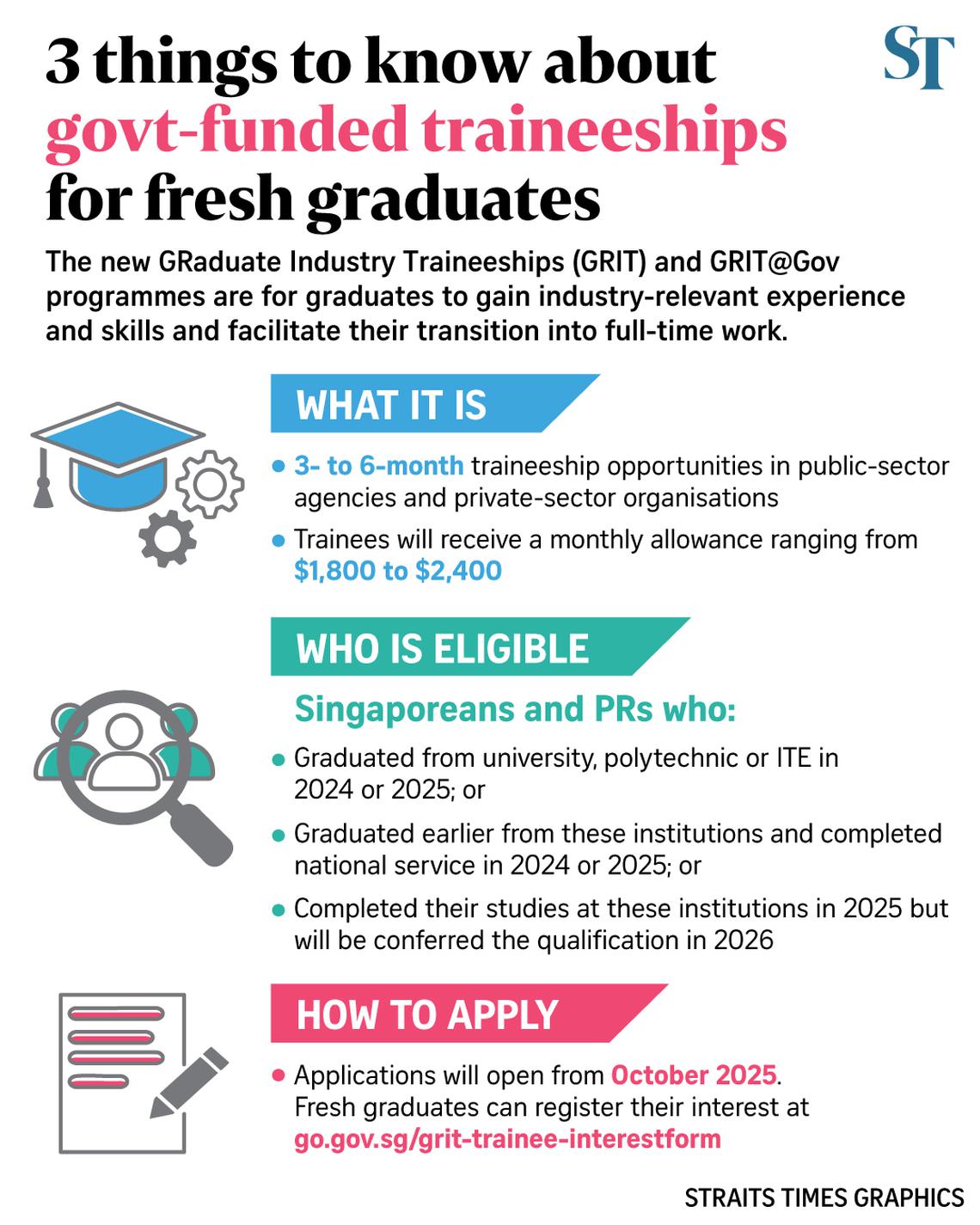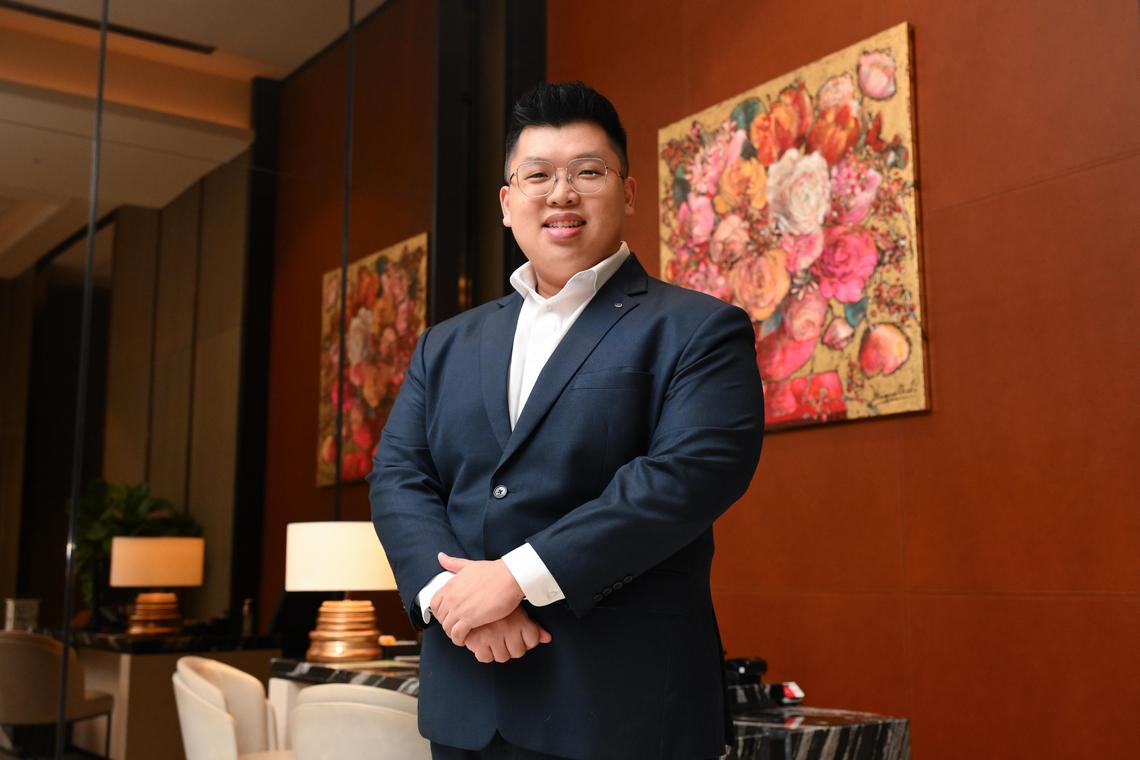SINGAPORE – Recent and soon-to-be graduates can apply for traineeships under a new scheme to tackle job concerns amid a more uncertain labour market and volatile economic climate.
Applications for the government-funded traineeships start in October, with up to 800 positions offered across various sectors for a start, each lasting three to six months.
Trainees will receive a monthly allowance ranging from $1,800 to $2,400 for the duration of their stint.
The amount may vary depending on the scope of each traineeship, said the Ministry of Manpower, Workforce Singapore (WSG) and the Public Service Division (PSD) in a joint statement on Aug 22.
The Government will fund 70 per cent of the allowance, while the host organisation will fund the rest.
The scheme was announced by Prime Minister Lawrence Wong in his
National Day Rally speech
on Aug 17.
It is aimed at boosting employability for young Singaporeans, namely Institute of Technical Education, polytechnic and university graduates.
Singapore citizens or permanent residents who graduated from these institutions, or others such as private universities and overseas institutions in 2024 and 2025, are eligible for the traineeships.
Those who graduated earlier and completed their national service in 2024 or 2025 may also apply.
Trainees completing their studies in 2025 but receiving their certification in 2026 are also eligible.
This initiative follows the latest annual graduate employment surveys conducted by universities and polytechnics, which showed
a drop in full-time employment for their fresh graduates
in 2024.
Details of the new Graduate Industry Traineeships (GRIT) and GRIT@Gov programmes were announced on Aug 22 by Minister for Manpower Tan See Leng at the OCBC Grow Your Way festival in Tanjong Pagar.
Speaking to the media, Dr Tan noted that besides these traineeships under GRIT, the public sector is also offering about 2,400 immediate vacancies for fresh graduates via the Careers@Gov job portal.
The authorities are prepared to increase the level of support, including funding more traineeships, if the labour market worsens and if long-term unemployment continues to rise, said the minister.
The GRIT programme, led by WSG, supports fresh graduates who are keen to gain exposure in private sector organisations, while the GRIT@Gov programme, helmed by PSD, helps graduates gain experience in public sector agencies.
“We have started on a much smaller scale in terms of the numbers, because we are actually very mindful that it does not cannibalise the full-time employment opportunities for many of these young graduates,” said Dr Tan.
“We don’t want it to cannibalise more mature employees… so companies must not have retrenchment plans in place so that they can then use this as a cheap source of labour. And we will be very strict in terms of how we dispense these monies.”
In a Facebook post on Aug 22, labour chief Ng Chee Meng said: “I’ve spoken to many young people who are understandably anxious about entering the workforce in these uncertain times.”
Mr Ng said the GRIT traineeships will give graduates the chance to pick up industry experience, sharpen their skills and build confidence as they start working life.
Employers will also benefit from tapping a pool of eager, capable young talent as similar traineeship schemes “have worked well before”, he added.
“At NTUC, we will continue working with the Government to strengthen support for our graduates, to help them not just find jobs, but also build meaningful careers,” he said.
WSG said it would, together with other agencies, identify “progressive host organisations from growth sectors” such as financial services, information and communications technology, as well as manufacturing and wholesale trade, to offer traineeships.
Companies in key growth sectors, including Grab, Micron, OCBC Bank, ST Engineering, and Sea and its subsidiaries, will be among the companies offering traineeships, said Dr Tan.
Roles will include those in areas such as data science, strategy and planning, business analytics, digital marketing and engineering.
Both programmes were developed in consultation with tripartite partners under the Singapore Economic Resilience Taskforce.
The task force was set up to explore ways to help businesses and workers navigate widespread uncertainties arising from US President Donald Trump’s tariff policies and shifting economic headwinds.
The initiative builds on the SGUnited Traineeships (SGUT) that were introduced in 2020 during the Covid-19 pandemic, which helped young people get paid training stints of up to six months.
Then, the Government funded 80 per cent of the training allowance while the companies funded the rest.
SGUT, which ran from June 2020 to March 2022, supported more than 12,500 trainees.

Close to nine in 10 found employment within six months after the programme, said Ms Gillian Woo, director of the Enterprise Programmes Division at WSG.
One young Singaporean who took on a traineeship under the programme was Mr Jonathan Lun, 28, who graduated from the University of Queensland with a degree in international hotel and tourism management in December 2020.
In the thick of the pandemic, when many businesses had frozen hiring, he applied for a six-month-long SGUnited Traineeship with Holiday Inn Express Singapore Clarke Quay as a front-of-house guest services agent.
He picked up skills as he rotated among different departments and was exposed to different hotel systems such as reservations and property management.

Mr Jonathan Lun applied for a six-month-long SGUnited Traineeship with Holiday Inn Express Singapore Clarke Quay as a front-of-house guest services agent.
ST PHOTO: SHINTARO TAY
After finishing the traineeship, his role was converted to a full-time one as a reservations agent. He worked in that position for a year before becoming an assistant sales manager.
Such traineeships are a “good safety net”, said Mr Lun, who is now a sales manager with Sofitel Singapore City Centre.
“As a trainee, you are able to explore, even make mistakes and learn from them…
“If you’re not sure what you want to do, traineeships can expose you to different departments, and you can find out what your interests and strengths are,” he said.
Ms Syainda Abdul Halil, 24, was offered a full-time job following a year-long traineeship at financial services firm JPMorgan, after graduating from Nanyang Polytechnic in 2021 with a diploma in marketing.
“It gave me a lot of exposure to real-world projects, where I had to communicate with real stakeholders…
“There was room to make mistakes, which made it a conducive environment for young talent to grow and be guided,” said Ms Syainda, who was recently promoted to the role of associate technology project manager.

Ms Syainda Abdul Halil was offered a full-time job after a year-long traineeship at financial services firm JPMorgan.
ST PHOTO: SHINTARO TAY
As a trainee, she had regular check-ins with her manager and open conversations about career progression.
Conversations about converting to a full-time role began at around the six-month mark.
She drew on transferable skills from her marketing experience and brought diverse perspectives to her job, because she did not come from a traditional finance background.
“The traineeship opened doors that I wouldn’t have access to otherwise and it gave me a career start, and from there I was able to build, step by step, to the role I have today,” she said.
Among the companies supporting the upcoming GRIT traineeships is OCBC, which expects to take on more than 100 tertiary graduates across functions such as consumer banking, wholesale banking and technology and operations.
It had hosted around 200 trainees under the SGUT programme in 2020 and 2021.
“Many of (these trainees) have since transitioned into a variety of full-time roles across the bank, including (those of) data scientist, financial analyst and tax advisory executive, among others,” said Ms Lee Hwee Boon, head of group human resources at OCBC.
“We are committed to nurturing young talent and building a sustained pipeline of talent that supports OCBC’s growth and Singapore’s financial sector.”
